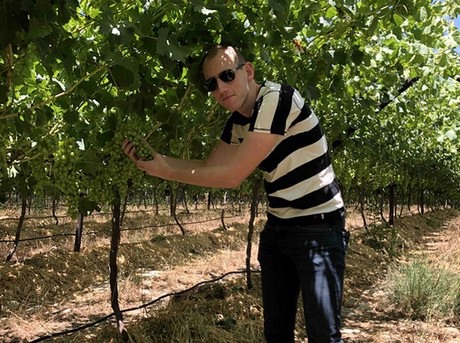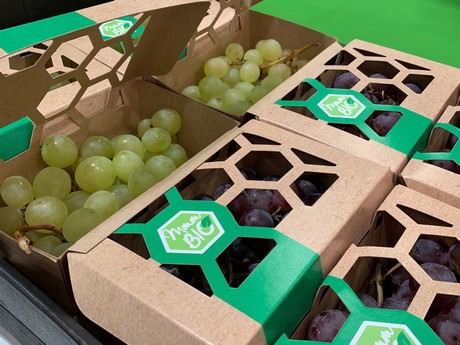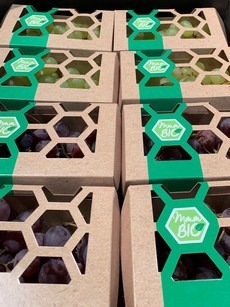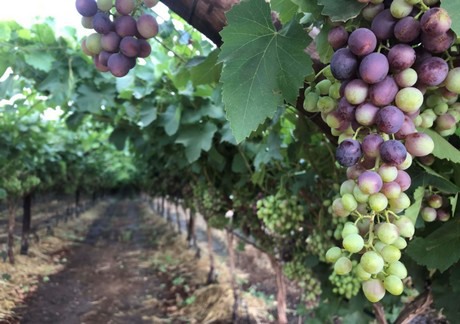The South African organic grape season started earlier this year, and its prospects look favorable, say Cornelis Ernst and Bart van der Vliet of OTC Organics. This Dutch company started importing organic grapes from South Africa more than a month ago again. They are t to operate more sustainably as a business, so we must be prepared to stick our necks out.”

Purchase Manager Cornelis Ernst in South Africa
These gentlemen can write a book about organic farming and all the challenges it brings. “The biggest challenge is quality and shelf-life,” says Cornelis, Purchase Manager at OTC. “With conventional cultivation, you can use a CO2 pathway for lower quality grapes, which means these grapes still arrive in a relatively good condition. We, however, have to ensure a perfect quality, which starts back at the farm already, and, so, in turn, with perfect soil quality and soil life.”
“Weather issues play a big role with organic and well as conventional farming, but if it rains before the grapes are harvested, there is more change with organic grapes that they will rot and have storage problems. While with conventional products which you can simply ship using a CO2 pathway, we do not know if we will get any grapes at all. Add the consequences of a ship’s delay to that, and you can begin to understand how challenging our sales planning is.”
Prospects
Last season, this company was plagued by delays - the ship arrives a week and a half late. According to Cornelis, things seem much improved this season. “The wind in Cape Town affect this,” he explains. “Due to high temperatures, this season started earlier than usual. Prospects look good, there is enough fruit on the vines, and the weather forecasts are (still) good for now. We are optimistic about the coming season, both quality and volume-wise.”
How prices compare to those in the conventional sector, depends on the season. "Last year, conventional grapes prices dropped dramatically. The price of organic grapes remained stable. We are expecting much better prices for the conventional product this year because the supplies are far better controlled. With organic grapes, we started with at the same price level as last year."
Plastic sludge
OTC Organics imports grapes in different types of packaging - 4.5kg loose, 10 x 400 g clamshell, and large packs of loose bunches, which they then repackage into their newly-developed grape box. “The idea for this grew from our clients’ and the consumers’ demand for an alternative to the plastic punnet”, says Bart van der Vliet, Sales and Marketing Manager at OTC Organics. “As soon as someone stands in a store and see plastic packaging, they immediately envisage a giant pool of plastic. Several of our clients are also clearly busy with the sustainability theme.”
 The recyclable grape carton packaging
The recyclable grape carton packaging
“We are one of the first importers of South African grapes to start this season with cartons and recyclable packaging.” Bart readily admits that since discussions are still in full swing, they are not sure if these grape boxes will eventually be the most sustainable choice. “No-one knows where these talks will end up. Since we are convinced we, as an organic business, had to take a step in this direction, we decided to see what consumers are sensitive to, and, at the moment, that is non-plastic packaging.”
Organic image “We did not opt for the grape box based solely because consumers are interested in this type of packaging, but also because it has an organic image,” adds Cornelis. “A natural material such as cardboard suites this image much better than plastic. The plastic discussion within the retail sector also concerns conventional grapes, but that is such a large item, we do not want to get involved. The smaller amount of organic grapes are well-suited to this. And, who knows, if things go well, conventional grapes' packaging might later be switched out for carton packaging.”
“We did not opt for the grape box based solely because consumers are interested in this type of packaging, but also because it has an organic image,” adds Cornelis. “A natural material such as cardboard suites this image much better than plastic. The plastic discussion within the retail sector also concerns conventional grapes, but that is such a large item, we do not want to get involved. The smaller amount of organic grapes are well-suited to this. And, who knows, if things go well, conventional grapes' packaging might later be switched out for carton packaging.”
“It will become clear in the coming season what our clients and the end consumer thinks of it,” says Bart. “Hopefully, it will take off. The carton packaging, with its sustainable appearance, draws a lot of attention on the shelves and tells a story at the same time. Choosing a different type of packaging is, of course, not risk-free, but it suits our company. This cardboard packaging also fits in with our philosophy of operating sustainably, and, in my opinion, you should also be willing to take risks.”
Price-conscious
Bart adds that there are significant differences from country to country when it comes to the share of organic versus conventional on retailers' shelves. “Germany has the largest organic share, followed by Scandinavia. The Netherlands is, however, lagging, which I think is because Dutch people are price-conscious when they shop."
"You also see there are no organic overseas grapes available from the Southern European countries. This is due to the pursuit of ‘local for local’. Many people want to buy organic products, but they would prefer them to be from local farmers rather than those far away.”
Christmas container
OTC Organics started importing grapes from the Northern Cape in South Africa more than a month ago. Halfway through January, they will move to the Western Cape in the south of that country. The company has been using airfreight since the season started on 27 November, and Cornelis hoped the first container would arrive just before Christmas.
That, unfortunately, does not happen every year. “It depends on when Christmas falls, but it is a fight just about every Christmas to get the “Christmas container’ here on time. We cannot go the whole Christmas week with only sea cargo; we simply do not make it."
“The conventional sector does not have this problem since they can start harvesting two weeks earlier in Namibia, and Peru still has grapes too. For now, you are very reliant on South Africa for organic imports. We are, therefore, coming into an empty market. To close the gap, we flew these grapes in for the first week, but it is also only in week one that we started getting large volumes. Depending on the weather, these sales will run through to week 15. So, once Christmas is over, everyone must start eating lots and lots of organic grapes,” he says, jokingly.

Revelation
When asked about expansion plans, Cornelis reacts enthusiastically, saying, “We always have plans to extend the season. We know there is a gap to and from South Africa. We are also getting demands from the retail sector to supply grapes once the Southern European season is over. We still have to disappoint these people at the moment because we can only deliver for 18 of the 25 weeks."
"We want to lengthen and move the programs ahead but, it is a fact that this takes three years before you have an organically-cultivated product. Sometimes, with the same growers and certain variety choices, you can deliver a few days earlier, but we are also looking at other countries.”
Behind the scenes, OTC Organics is hard at work on a sure thing. Bart gives a hint, saying, “We are currently looking at different countries to see if we would be able to fill the gaps in the market so we might be able to have organic grapes available earlier already.” To be continued…
Cornelis Ernst
cornelisernst@otcorganics.com
Bart van der Vliet
bartvandervliet@otcorganics.com
OTC Organics
T: +31 (0) 885 880 400
E: bartvandervliet@otcorganics.com
E: info@otcorganics.com
